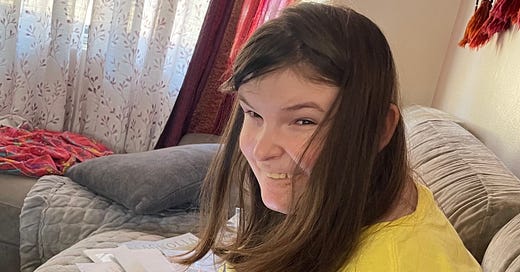I posted about the anguish of raising a child with Moderate ID on Facebook earlier this week, but there’s a line from the post that’s been haunting me: “The guilt of . . . wishing things were different can be crushing.”
Wishing things were different but knowing that they will never change nor end.
I had my Annual Review with my Department Head the other day, and he was asking about Arya’s condition (reluctantly I’ll add, simply because although most people would like to ask questions, the societal stigma of disability makes most uncomfortable). In an unguarded moment, I answered his questions and then added, “and it’s never going to change.”
I mean, she’s not going to get “better.” Just consider the weight of that.
Anyway, here’s the entirety of what I posted earlier, and full-disclosure, I did not write this.
“The emotional anguish of raising a child with moderate intellectual disability (ID) is complex, persistent, and deeply personal. It often includes a mix of profound love, grief, frustration, and isolation. Some key aspects include:
· Chronic Grief & Loss: There’s an ongoing sense of mourning—not just for the initial diagnosis but for every milestone that is delayed or never reached. Parents often feel sadness watching peers move forward while their child remains developmentally behind.
· Exhaustion (Physical & Emotional): The constant need for supervision, advocacy, and hands-on care can be overwhelming. Daily tasks—things that should become easier as a child grows—often remain difficult, requiring unrelenting effort.
· Loneliness & Isolation: It’s hard for others to truly understand the depth of the experience. Family and friends may offer empty platitudes or drift away, leaving parents without a real support system.
· Fear for the Future: The uncertainty about what happens when the parent is no longer there to provide care is a haunting thought. Questions like “Who will look out for them?” and “Will they be safe?” are ever-present.
· Anger & Frustration: There’s frustration with bureaucratic systems that make accessing services difficult, anger at the lack of understanding from others, and sometimes even resentment toward the unfairness of the situation.
· Guilt & Self-Doubt: Parents constantly question if they’re doing enough, if they’re making the right choices, or if they could have prevented something. The guilt of needing a break, feeling resentment, or wishing things were different can be crushing.
· Joy & Love Intertwined with Pain: Despite the hardships, there’s an immense love for the child. Small victories are monumental, and the bond is often incredibly deep. However, this love doesn’t erase the pain—it coexists with it.”




